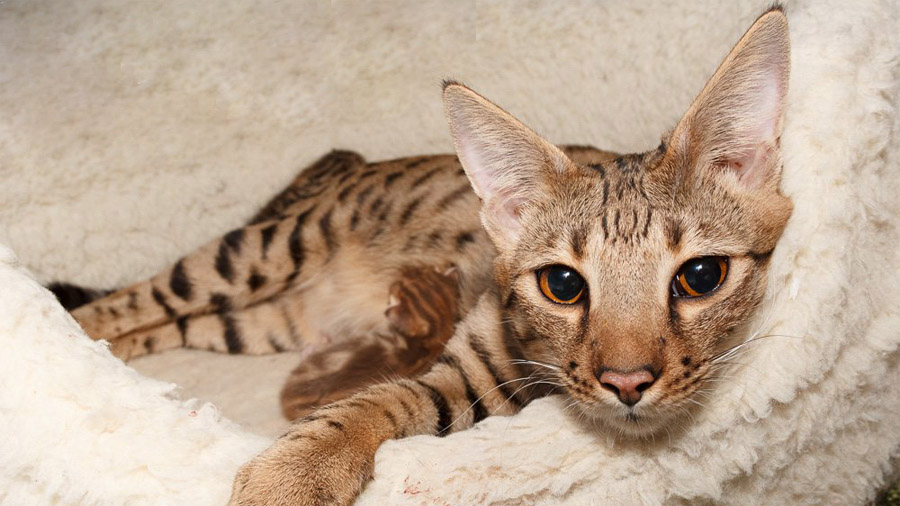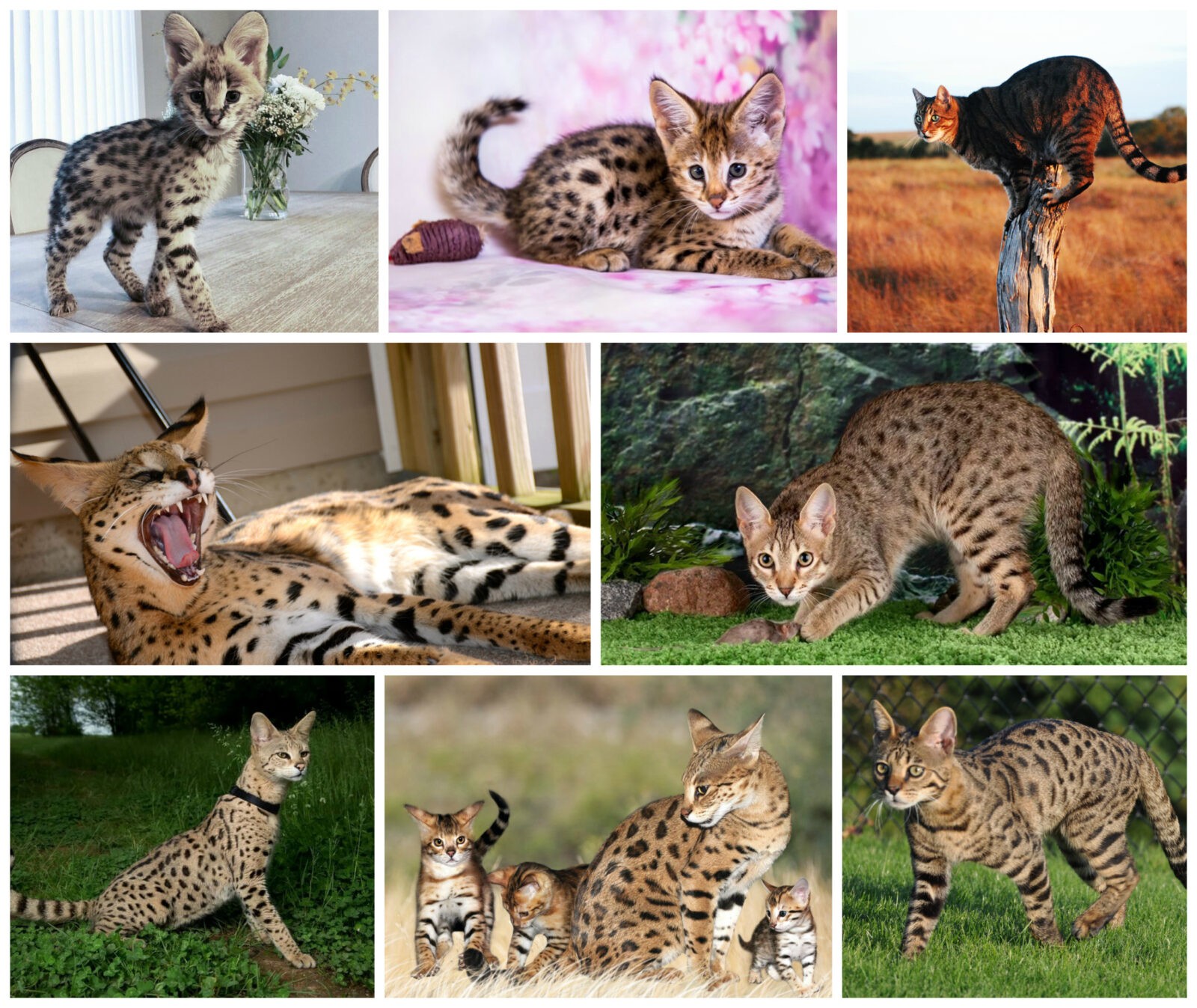
Краткое описание породы
Саванны могут иметь различный окрас и разнообразные узоры: черный, коричневый, пятнистый, черно-серебристый, пепельный и некоторые другие оттенки упомянутых цветов.
Большинство кошек саванн имеют четкие черные и темно-коричневые пятна на золотистом, кремовом, песчаном или белом фоне. Сами пятна могут иметь круглую, овальную или удлиненную форму. Упомянутые узоры часто придают животному мраморный оттенок.
Поскольку во время селекции происходило скрещивание различных пород кошек, иногда саванны могут иметь окрас, который не вписывается в официальный стандарт породы, к примеру, шоколадный, голубой, рыжий.
Голова треугольной формы, увенчанная большими, широкими ушами, поддерживается грациозной длинной шеей. Глаза у кошки среднего размера и могут иметь любой цвет. А вот цвет носика питомца может варьироваться от розового до черного. При этом, черный цвет носа имеют, как правило, саванны кошки с черной шерстью.
Если сравнить саванну с человеком, занимающимся спортом, то такое сравнение было бы с баскетболистом. Все дело в том, что саванна имеет длинные ноги и достаточно сильное тело. Стоит обратить внимание, что задние ноги саванны длиннее передних.
Своего полного развития саванна достигает в трехлетнем возрасте, а вот своего привычного роста кошка этой породы достигает примерно в годовалом возрасте. Развитие других частей тела продолжается несколько дольше.
Основная информация
| Название породы: | Саванна |
| Страна происхождения: | США |
| Время зарождения породы: | 1986 год |
| Вес: | 4 – 10 кг |
|
Код EMS:
|
– |
| Продолжительность жизни: | 17 – 20 лет |
| Цена котят: | 2200 – 7000 $ |
| Самые популярные клички: | список кличек для кошки Саванна |
Оценка характеристик породы
|
Адаптивность
(Определение, означающее, насколько легко кошка может приспосабливаться к изменениям в жизни)
|
🐱🐱🐱🐱🐱 |
|
Уровень линьки
(Уровень и частота выпадения волос у животного)
|
🐱🐱🐱 |
|
Уровень нежности
(Уровень и количество нежности и ласки, которую кошка отдает взамен на внимание к себе)
|
🐱🐱🐱🐱🐱 |
|
Социальная потребность
(Необходимое количество контактов кошки с другими животными, а также людьми)
|
🐱🐱🐱🐱🐱 |
|
Груминг
(Количество купаний, расчесываний, а также необходимое количество сеансов профессионального груминга, необходимого кошке)
|
🐱 |
|
Дружелюбность в незнакомой среде
(Особенности поведения кота в обществе с незнакомыми людьми или в незнакомой обстановке)
|
🐱🐱🐱🐱🐱 |
|
Вопросы здоровья
(Потенциальный уровень состояния здоровья кошки)
|
🐱 |
|
Интеллект
(Способность кошки к мышлению и решению возникающих трудностей)
|
🐱🐱🐱🐱🐱 |
|
Дружелюбность к детям
(Фактор, определяющий насколько кошка дружелюбна к детям, любит ли она с ними играть и терпеть некоторые детские шалости)
|
🐱🐱🐱🐱 |
|
Игровая активность
(Понятие определяется самим его названием, и, как правило, встречается почти у всех кошек)
|
🐱🐱🐱🐱🐱 |
|
Дружелюбность к собакам
(Склонность кошки находить общий язык с собакой)
|
🐱🐱🐱🐱🐱 |
Фото кошки Саванна:

История кошки Саванна
Кошка породы саванна была выведена в результате скрещивания домашней кошки и дикой африканской кошки 7 апреля 1986 года. В результате первого скрещивания родился котенок, которому дали имя «саванна». Узнав о рождении такой кошечки, заводчики по имени Патрик Келли и Джойс Сроуф объединились для совместной работы по созданию совершенно новой породы.
Среди пород кошек, которые внесли свою лепту в процесс появления саванны кошки, относятся бенгальская, египетская кошка мау, ориентальная кошка и некоторые другие породы. Официальная регистрация породы Международной ассоциацией кошек произошла в 2001-м году. С этого года представители породы начали принимать активное участие в различных выставках и соревнованиях.
Характер кошки Саванна
Если вы ищете спокойного питомца, готового часами сидеть у вас на коленях, то кошка саванна вам не подойдет. Эти питомцы относятся к очень активным животным, которые практически постоянно находятся в движении. Они обожают бегать, прыгать. Саванны легко привыкают к прогулкам на поводке. Примечательно, что кошки этой породы относятся к группе тех немногих кошек, которые не прочь поплескаться в воде. Саванны — уверенные, любопытные и дружелюбные коты.
В то время, когда большинство кошек не особо реагируют на гостей или других незнакомцев, саванны будут радостно приветствовать людей, пришедших к вам домой. Особенно радостные эмоции вызывает у питомцев встреча с членами семьи.
Саванны — очень умны и любят воду. Острый ум этих питомцев помогает им самостоятельно открывать краны. Поэтому, уходя из дома, многие владельцы этих кошек закрывают общий кран подачи воды.
Особая активность питомца говорит о том, что необходимо заблаговременно побеспокоиться о хрупких предметах в доме, в том числе речь идет и о предметах декора. Так как саванны активны, в процессе игры они могут сбивать вазы, статуэтки. Также могут повредить электрические провода от удлинителей. Чтобы несколько уменьшить разрушительность этой кошки, нужно купить игрушки для питомца в достаточном количестве. При этом, они должны быть интерактивны, иначе саванна ими не заинтересуется.
Для того чтобы савана кошка чувствовала себя комфортно и правильно развивалась ей необходимо уделять много времени. Убедитесь в том, что у питомца есть достаточное количество интересных игрушек, которые скрасят время отсутствия дома хозяина или членов семьи. Если для вас это задание кажется сложным, то лучше выбрать кошку другой породы.
Саванны прекрасно уживаются с другими питомцами, которые также отличаются активностью и любознательностью, например с мейн-кунами, сиамскими или ориентальными кошками, рэгдоллами и с другими активными кошками.
Имейте ввиду, что совместное проживание кошек саванн с некоторыми другими питомцами — небезопасно. В первую очередь речь идет о хомячках, крысах, попугаях, канарейках и т.п. Саванна кошка хотя и не отличается особым охотничьим инстинктом, но оставлять ее наедине с упомянутыми животными нельзя, если вы не хотите гибели своего любимого попугайчика или, к примеру, шиншиллы.
Содержание и уход
Шерсть средней длины кошек саванна необходимо вычесывать один-два раза в неделю. Этого вполне достаточно для удаления отмерших волосков и предотвращения распространения шерсти по дому и мебели.
Зубы, как и при уходе за большинством других кошек, нужно чистить раз в неделю для предотвращения пародонтоза и иных проблем стоматологического характера.
Для того чтобы защитить питомца от возникновения заболеваний, в том числе и дерматологических (выпадение шерсти, лишай, блохи и т. д.), необходимо ограничить общение саванны с другими незнакомыми животными. Поэтому нельзя допускать того, чтобы кошка гуляла на улице без присмотра хозяина. Кроме того, из-за особой активности представителей этой породы они часто попадают под колеса автомобилей. Вот почему нужно быть предельно осторожным во время прогулок на открытом воздухе.
К регулярным гигиеническим процедурам относится контроль и уход за ушами. Необходимо еженедельно осматривать уши на предмет воспалений, раздражений и наличия инфекций, таких как ушной клещ. Обрабатывать ушные раковины лучше всего специальным раствором, назначенным ветеринаром.
Саванна — это активная и очень социальная порода, которая может подружиться даже с собакой, поэтому является лучшим выбором для активных семей, в которых есть другие домашние любимцы.
Если вы собираетесь оставить кошку этой породы на целый день, то неплохо было бы не просто оставить питомцу достаточное количество различных интересных игрушек, но оставить ей в качестве компаньона другого питомца, к примеру, другую кошку. Но имейте в виду, что речь идет о животных, которые выросли вместе! Для этого с раннего возраста необходимо социализировать питомцев, знакомить их друг с другом.
Здоровье и болезни
Несколько интересных фактов
- Появлению кошек породы саванны помог случай: когда домашняя кошка была скрещена с дикой африканской кошкой.
- Саванны кошки очень активны и плохо переносят одиночество. Очень важно приучить ее к когтеточке и лотку.
- Представители этой породы неплохо уживаются с кошками других пород, а также с собаками. Единственное, что необходимо для этого сделать — обеспечить раннюю социализацию питомцу.
- Саванны, в отличие от большинства других кошек, не страдают генетическими заболеваниями.
- Окрас саванн бывает весьма разнообразным, благодаря чему даже самый скрупулезный человек сможет выбрать для себя питомца с понравившимся окрасом.
- Новичку очень сложно отличить савану от некоторых других пород. Вот почему необходимо уделять особое внимание процессу приобретения питомца. Лучше всего покупку совершать у проверенного заводчика, а вовсе не в зоомагазине или неизвестного селекционера.
- За кошкой породы саванна очень легко ухаживать — достаточно лишь несколько раз в неделю вычесывать животное и совершать несколько других несложных процедур.
- Саванна — чрезвычайно социальная сошка, поэтому нуждается в огромном внимании со стороны хозяина и членов семьи. Саванна не подойдет для очень занятых людей, которые проводят большинство времени на работе.
- Кошки породы саванна очень активны. Будьте готовыми к тому, что у вас в доме появится питомец, который будет бегать, прыгать и резвиться. Также подготовьтесь к тому, что вам нужно будет обеспечить питомца достаточным количеством активных игр и упражнений.
Питомники и заводчики
Материал мы заимствовали с замечательного сайта наших партнеров DOGCATFAN.COM о кошках и собаках, автор dogcatfan
